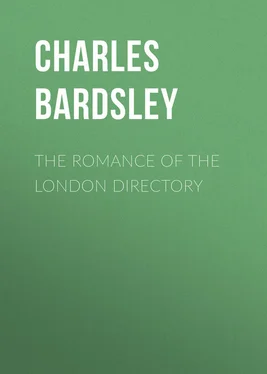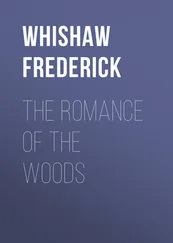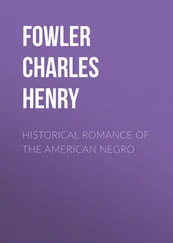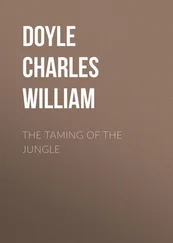Charles Bardsley - The Romance of the London Directory
Здесь есть возможность читать онлайн «Charles Bardsley - The Romance of the London Directory» — ознакомительный отрывок электронной книги совершенно бесплатно, а после прочтения отрывка купить полную версию. В некоторых случаях можно слушать аудио, скачать через торрент в формате fb2 и присутствует краткое содержание. Жанр: foreign_antique, foreign_prose, на английском языке. Описание произведения, (предисловие) а так же отзывы посетителей доступны на портале библиотеки ЛибКат.
- Название:The Romance of the London Directory
- Автор:
- Жанр:
- Год:неизвестен
- ISBN:нет данных
- Рейтинг книги:5 / 5. Голосов: 1
-
Избранное:Добавить в избранное
- Отзывы:
-
Ваша оценка:
- 100
- 1
- 2
- 3
- 4
- 5
The Romance of the London Directory: краткое содержание, описание и аннотация
Предлагаем к чтению аннотацию, описание, краткое содержание или предисловие (зависит от того, что написал сам автор книги «The Romance of the London Directory»). Если вы не нашли необходимую информацию о книге — напишите в комментариях, мы постараемся отыскать её.
The Romance of the London Directory — читать онлайн ознакомительный отрывок
Ниже представлен текст книги, разбитый по страницам. Система сохранения места последней прочитанной страницы, позволяет с удобством читать онлайн бесплатно книгу «The Romance of the London Directory», без необходимости каждый раз заново искать на чём Вы остановились. Поставьте закладку, и сможете в любой момент перейти на страницу, на которой закончили чтение.
Интервал:
Закладка:
Notice under “A,” the baptismal names are double all other classes added together; while under “B,” the local names, excluding doubtful instances (a large proportion of which must be local), are also double the rest. This is easily explained. Five hundred years ago some Christian names were enormously popular. Andrew was one. Under the forms of Andrews and Anderson, etc., we have a total of 290 names. Allen was another. There are 250 “Allens” 4 4 I say there are 250 Aliens in London. But the Directory only gives the name of the head of the family. Hence in the aggregate there may be 2,000 Aliens dwelling in the metropolis.
in London, without adding other forms of the name. There is no local name under “A” to compare with these. Under “B” this position is reversed. Of local names there are about 142 Barnes, 56 Bartons, 37 Becks, 85 Berrys, 55 Boltons, 44 Booths, 58 Bradleys, 120 Brooks, besides a large list of lesser but fairly proportionate names. Baptismal names under “B” are not so fortunate. ’Tis true there are 70 Barnards, 66 Balls (Baldwin), 83 Bartletts (Bartholomew), 52 Bates (Bartholomew), 199 Bennetts (Benedict and Benjamin), and 40 Batemans (an old English baptismal name), but with these the list is well-nigh exhausted. Under “C” the occupative class is larger than the baptismal. This would be unaccountable did we not remember that there are no less than 283 Cooks and Cookes, 265 Coopers, 221 Carters, 64 Chandlers, 51 Carpenters, and 35 Cartwrights in the Directory. Under “C,” too, the official class is very strongly represented. There are about 52 °Clerks, Clarks, and Clarkes, not to mention 12 °Cohens and Cohns ( i. e. , priest), which, though of Jewish origin, are not set down in the foreign list, inasmuch as the vast majority of them have sprung from Cohens settled in England for centuries; indeed, a large number of them pass for pure English blood. Nicknames are best exhibited under “B,” for there are no less than 650 forms of Brown in the London Directory alone, not to mention 160 Bells and 120 Bishops – one hundred and twenty Bishops in London! This beats all the episcopal conferences of modern times hollow. By-and-by I shall explain why “Bishop,” and such names as “Pope,” “Cardinal,” “Prince,” and “King,” must be set in the nickname class. I now may note the fact, and pass on. With respect also to the 160 Bells, we must not forget that they have three distinct origins. The following registered forms are found five hundred years ago: – “Peter le Bel” ( i. e. , the handsome), “Richard fil. Bell” ( i. e. , the son of Bell, i. e. Isabella), and “John atte Bell” ( i. e. , at the Bell, the sign-name at some country hostel). Our friends the Bells may choose which they like. I should select the first, I think, but tastes may differ. Again, notice under “ E ” that the baptismal names far outnumber the aggregate of all other classes, the occupative being without a representative at all! The popularity of Edward and Elias (always called Ellis) has done this. There are about 330 Edwards in London; and adding together the different forms of Ellis, such as Elliot (the pet name of Ellis), Eliot, Elliotson, Ellice, Ellicot (the pet form of Ellice), Ellison, Elkins, Elkinson, Elcock, Ell, Else, Elson, and a dozen other dresses in which the name is arrayed, all of which I shall explain hereafter, we have no less than 370 representatives of Elias. That the Crusades brought “John” and “Elias” into favour in England is easily proved, and I shall have a word to say about the matter in another chapter. There are a hundred interesting remarks to make about such names as these, if one allowed oneself to be tempted out of the beaten track, but I control myself. Notice lastly, that under “D” one-tenth of the names are foreign – that is, of recent importation from the Continent. The explanation of such a large proportion is that very many foreign local surnames preserve the “de,” or “del,” or “de la,” as a prefix. “De Jersey,” “De Grelle,” “Delattre,” “Delcroix,” “Delavanti;”so they run.
In concluding this chapter, the question may be asked – and a very important one it is – how many differently spelled names, counting a single spelling as one, are there in each class? The answer to this will show the vast predominance of local names in our Directories. If we exclude foreign (nearly all local) and doubtful (of which three-fifths must be looked upon as local), then the local class under A, B, C, D, and E, is double all the rest. We may prejudge that this ratio applies to the whole alphabet.
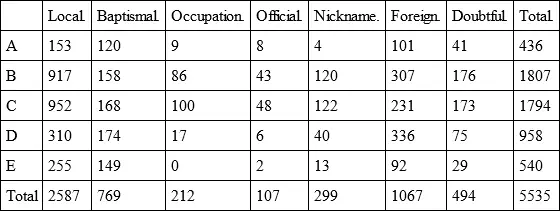
Thus the total number of distinct surnames in the London Directory under the first five letters is 5535. Omitting foreign and doubtful, the local class are double the rest. Therefore the rhyme quoted by Camden is true, that
“In ‘ford,’ in ‘ham,’ in ‘ley,’ and ‘ton,’
The most of English surnames run.”
All names with this termination are local, and comprise a large proportion of our national nomenclature.
One word about the doubtful class, and I have done. A hundred years ago even, as our registers show, there was no established orthography for surnames in the highest ranks of society. How much less so, then, among the illiterate orders! I find a clergyman’s name, Bann, spelled Bann, Ban, Banne, and Band between 1712 and 1736. He was Rector of St. Ann’s, Manchester, during that period. The spelling of Shakespear’s name at this moment is the subject of almost bitter conflict. Being clearly of the nickname class, my view is that it must be written “Shakespear.” Illiterate clerks have done much to obscure the meaning and origin of names. I know a register where the clerk has written “Pickering” as “Pikrin,” and on the next page informs the reader that several names have been “rong placeed.” “Pamela” he inscribes as “Permelea.” Butcher is found in the London Directory in the following forms: – “Boucher,” “Bowcher,” “Bowker,” “Bosher,” “Bowsher,” “Bowser,” “Boutcher,” and “Botcher.” The Norman “Chesney” (equivalent to English “Oakes”) is found as “Cheney,” “Chaney,” “Cheyney,” “Chesney;” and “Chesnil” as “Chisnall,” “Chisnell,” and “Channell.” Thus, too, “Solomon” becomes “Slowman” and “Sloman.” Sir William Dugdale found the Cheshire “Mainwarings” in no less than 131 forms; but this will not seem so strange when we consider that they include “Mainwayringe,” “Meinilwarin,” and “Mensilwaren”!
I could furnish endless instances of names that have undergone corruptions of this kind through defective spelling, and the lack of a standard orthography. Few people would recognise Oursley as Ursula, but that is a common form in the seventeenth century, when that was one of our commonest girl names. In Hokington Church, under date 1611, occurs the following entry: —
“George, sonne of Fenson Benet, and Jane, baptised.”
A previous Rector had been one Vincent Goodwin, and being popular, many of his parishioners had had children christened after him. The form entered is invariably Fenson, and I dare say after a generation or two none of the less educated would know what the original name had been. In the Calendar of Pleadings we find that one Quintin Snaneton, of Gringley Manor, made three several suits within ten years – all in the reign of Good Queen Bess. He is thus entered on each occasion: —
Читать дальшеИнтервал:
Закладка:
Похожие книги на «The Romance of the London Directory»
Представляем Вашему вниманию похожие книги на «The Romance of the London Directory» списком для выбора. Мы отобрали схожую по названию и смыслу литературу в надежде предоставить читателям больше вариантов отыскать новые, интересные, ещё непрочитанные произведения.
Обсуждение, отзывы о книге «The Romance of the London Directory» и просто собственные мнения читателей. Оставьте ваши комментарии, напишите, что Вы думаете о произведении, его смысле или главных героях. Укажите что конкретно понравилось, а что нет, и почему Вы так считаете.
